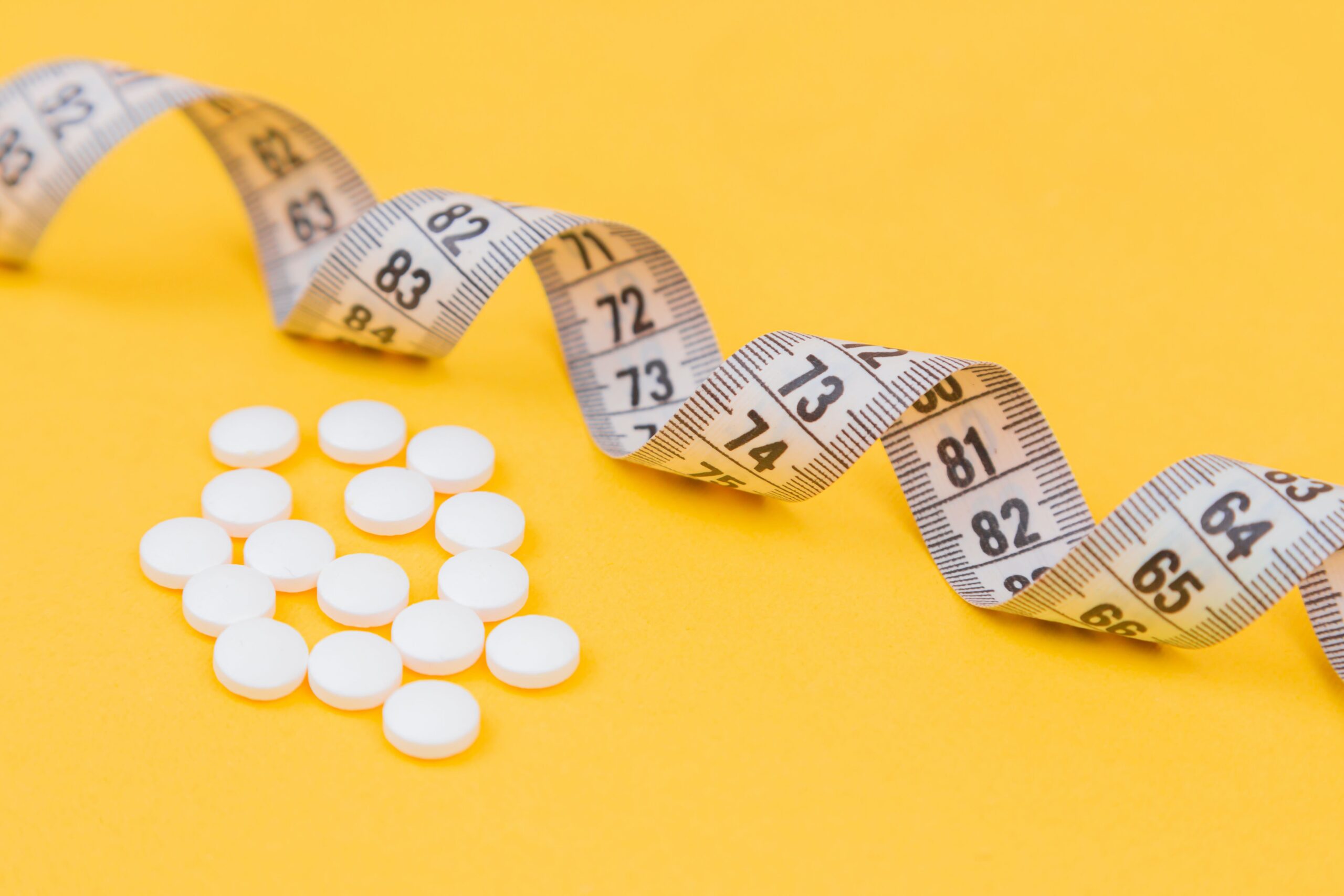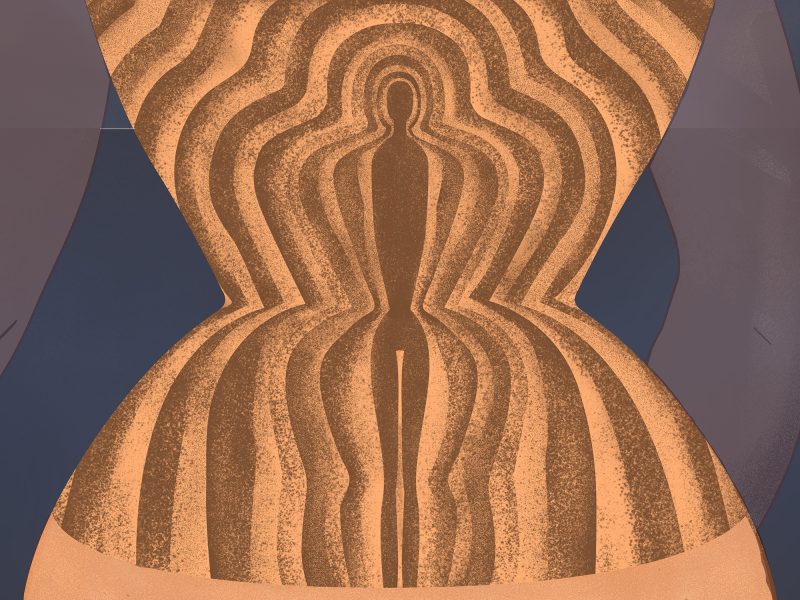A powerful argument that fat people should be accorded the same dignity that social movements like #MeToo and Black Lives Matter demand.
Aubrey Gordon’s What We Don’t Talk About When We Talk About Fat is a book about being trapped. It is rooted in trauma and designed, at turns, to break your heart and open your eyes to the humanity of a scorned and maligned demographic. It is also another volume in the generally shouty, scolding, so-called “woke” rhetoric that has shot through the public discourse like a never-ending Reddit thread.
The path to inclusion, apparently, is balling out strangers on the internet and hosting a podcast. Gordon excels at both. She first came to fame as the author of Your Fat Friend, which she wrote anonymously and subtitled “Essays on life as a very fat person.” As the title of her undertaking implies, Gordon has set herself apart from a default confrontational stance. Her tone is direct, earnest, informative—uninterested in trauma porn. The same cannot be said of her voice on Twitter, but such is life when expressed in a maximum of 280 characters.
I first became acquainted with Gordon through a hilarious, often brilliant limited episode podcast about the dieting industry, which she co-hosts with Huffington Post journalist Michael Hobbes. Called Maintenance Phase, its tagline is “wellness & weight loss, debunked & decoded.” Much like Your Fat Friend, the tone of the podcast conveys to the listener that she is implicitly on the same team as the co-hosts: away we go, together, to laugh at the sick standards and twisted marketing schemes that warp our view of the world and threaten our psychic wellbeing! The duo’s takedown of Moon Juice (“What the fuck is an adaptogen?”) is one of the funniest things I listened to in the past year; the episode on the Twinkie Defense, exploring the moral panic behind the legal defense that exculpated Harvey Milk’s killer, is moving and especially well researched.
What We Don’t Talk About When We Talk About Fat is not a memoir but rather “a mix of memoir, research, and cultural criticism all focused on unearthing our social and cultural attitudes toward fat people.” The aim is to accord fat people the same dignity and steps toward harm reduction that other social justice movements, like Black Lives Matter and #MeToo, demand.
First things first: I was almost giddy to read a book published in 2021 that tells public health experts—and pretty much everyone else—that they are dead wrong and can fuck off. After this pandemic year of public health obsession, shaming (e.g., for wearing or not wearing a mask), and broadly asking to speak to the manager, it is refreshing to see a woman stand her ground and explain fat shaming and the diet industry to me.

Gordon trashes BMI (Body Mass Index) as a racist, meaningless marker; she deftly explains how blaming fat people for being fat allows us to avoid taking collective responsibility for a widespread problem, to indulge our biases, and isolate fat people from equal pay, housing, and medical care. Her arguments bear the hard won credibility of a woman who has been mocked, menaced, and bullied online and off throughout her life and presently wears a size 26. Biography is Gordon’s chief credential, and her stories of discrimination and humiliation at the hands of anyone from landlords to flight attendants will make you shake with rage. On her podcast, she speaks of “the shitty economy of trauma” and how she needs to be “vivisected” for anyone to buy into her arguments.
What We Don’t Talk About When We Talk About Fat is very much a book written by a woman. To be sure, we are all trapped in these flesh suits. To be alive as a woman, in particular, is to experience being judged on your looks before all else. Describing viral videos that shame fat people, Gordon writes, “It was surreal to watch it all unfold, this litigation of my body, a voiceless inconvenience, an inanimate obstacle.” As a woman in America, I must confess it was surreal to read that sentence. I understand my role is to be a reader, and not to place myself in Gordon’s lived and often excruciating narrative, but at several points in this book I felt lectured to about my own lived experiences as a woman in a way that baffled me.
For instance: Gordon is at pains to define a difference between fatcalling and catcalling: “Catcallers do not consider themselves to be wooing me, concocting faux romances in their minds. I do not face the inconveniences of chivalry…Instead, I face…unsolicited disclosures of men’s rape fantasies.” As I read that paragraph, I couldn’t help but think, #MeToo, Aubrey! That’s exactly what it’s like! And, even if details differ, why spend pages denigrating the trauma of catcalling in favor of the paramount trauma of fatcalling? Why must we rank trauma? Why is it all a contest? Both things suck.
Gordon indulges in moments of intersectionality, but male aggression on an empty street is also familiar in the forms of gay bashing or bigotry—as well as straight-up catcalling. We can (and should) create room for fat women in feminism without invalidating someone else’s narrative. And, while we are at it, I’d like to point out that dating apps are humiliating for everyone.
No one wants to be pathologized; this is something the gay rights community has been teaching us for decades. Knowing Gordon is a fierce advocate both in the queer space and for reproductive freedoms, the following sentiment left me gobsmacked:
“The world of straight-size people is a reliable one. In their world, services are procured. Healthcare offered is accessed. Conflict arises primarily from active decisions to provoke and is rarely—if ever—prompted by the simple sight of a stranger’s body. The biggest challenges with anyone’s individual body are their attitude toward their own skin, not issues of security, dignity, or safety from bodily harm.”
This simply isn’t true. Americans are denied access to healthcare for a plethora of reasons that include race, income, sexuality, gender identification, and immigration status.
Gordon is at her strongest writing about how cultural conditioning yields a cruel smugness:
“Media messages about revenge bodies and baby weight and beach bodies abound, conditioning our feelings about our own bodies the ways that we treat those who are fatter than us,” she writes. She references a damning Wharton study about how “obesity serves as a proxy for low competence,” and compellingly links this attitude to legalized weight discrimination in many states.
“Anti-fatness,” Gordon asserts, “is a way for thinner people to remind themselves of their perceived virtue. Seeing a fatter person allows them to remind themselves that at least I’m not fat. They believe that they have chosen their body, so seeing a fat person eat something they deem unhealthy reminds them of their stronger willpower, greater tenacity, and superior character.”
This line of thought is redolent of the Calvinist doctrine of predestination and Weber’s Protestant Work Ethic—it’s as American as it gets. In this vein, I am troubled by an underlying assumption that crops up again and again in this book: that we are empowered and enabled to participate in public discourse once we are consumers. Surely our humanity is not tied to our ability to participate in capitalism. Personally, I think people should aspire to a lot more than earning more money and being able to buy clothes in their size. I would like to see us dream bigger than a shopping spree. What else are we gunning for here? More invidiously, what industry will co-opt these upper tiers of obesity? Each June, the Gay Pride Parade boasts multiple floats from big banks and corporations: does fat acceptance look like a TD Bank ad? Can someone chart a course out of this capitalist trap?
The book also contains the seeds of some serious fatalism, and, as it goes, a serious paradox.
On the one hand, Gordon argues passionately against BMI as a valid metric and size as an indicator of health. At one point, she even lauds a few anti-diet dieticians. She writes of studies that point to vile and widespread medical bias against fat people, even in medical schools. Yet, she also insists that the prevalence of fat Americans is a consequence of substandard nutrition, processed food and poor education—deficits she traces back to New Deal agricultural policy and the Reagan Era’s war on obesity.
So, we hold both of these truths to be self-evident: being fat is okay and not a threat to one’s health, but having a fat society is a problem we must collectively solve.
Gordon also claims that 97 million Americans diet and it’s a $66 billion-industry. But, she says 98 percent of dieters fail. This made me wonder: what constitutes a failure? What constitutes a diet? Success metrics are strange, and their definition is often slippery to the point of slime. When my own father was dying of cancer, I learned that “success” at Memorial Sloan Kettering Cancer Center is defined as living for another five years. If it doesn’t look like you’ll make it that long, they don’t treat you for fear of sullying their numbers.
So: who is in these diet studies? What did they want to achieve? Where did they start? When I dove into the footnotes to learn the rationale behind the numbers, I was led to a Psychology Today author promo listicle: “6 Reasons Smart People Don’t Diet.” The statistical improbability of “success” pinned to these numbers allows for an ugly tendency to flay any follower engaged in weight loss. On her podcast, Aubrey says she believes it was a fair boundary to block anyone with an Instagram bio that states an aspirational weight—although she herself doesn’t do so.
Isn’t it possible to both understand that the diet industry is largely shambolic and also leave room for people to try and change their bodies a little if they want to? A before-and-after photo is not inherently toxic. Perhaps social media is the bigger issue, with all of its attendant lies around displays of wealth and heteronormative couplehood—while we are on the topic.
Somewhere between being resigned to genetic predisposition and indulging in the freak show that is The Biggest Loser, I’ve got to believe there is a middle ground where we have a bit more acceptance and agency. Call me an optimist. How can a writer as smart as Gordon so sharply point out the sly complicity in Heinz buying Weight Watchers, but come down so hard on Michelle Obama for her “Let’s Move” campaign and any poor schmuck trying to lose a little weight? In hanging readers out to dry at various points, Gordon lowballs the universality of her message. Movingly, she writes, “The war on childhood obesity had given up on me, and over time, I learned to give up on myself…At eleven, I clung desperately to the idea that my body could and would change—that, somehow, I would become thin. Then, and only then, could my real life begin.” Who didn’t feel that way in some capacity as a middle schooler?
We need to treat fat people—and everyone—with more kindness and consideration. But there is nothing wrong with trying to grant those same people a sense of autonomy and agency to decide on their own definition of defeat or victory. For Gordon, it’s having the space to be the woman she is right now; for others, it might mean shedding 20 pounds put on during a stressful, sedentary pandemic. There must be room for someone trying to figure out what works for their own highly personal wants and needs.
It breaks my heart that the end of this book must focus on harm reduction. In her final chapter, Gordon writes, “We deserve a personhood that does not make size or health a prerequisite for dignity and respect.” We do. And if we don’t find one that we all can fit in together as a nation and as a culture, it’s not so much that we will be trapped but, rather, that we’ll know for certain that it’s been a trap all along.



